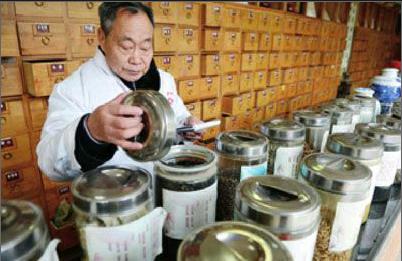Should Recipes for Chinese Medicine Be Open?
2014-06-17

Recently, Yunnan Baiyao, a hemostatic powdered medicine famous for stopping bleeding and relieving pain, was thrown in the spotlight as its manufacturer admitted the medicine contains aconitum, a toxic herbal ingredient that, if used improperly, could cause discomfort like numbness of the mouth and limbs, nausea, and even life-threatening conditions such as breathing difficulties and cardiac arrhythmia.
Yunnan Baiyao Group Co. Ltd. announced it has improved its product information disclosure as required and claimed its products are safe as its special processing technology has greatly reduced the toxicity of the aconitum. However, it still didnt disclose the full formula of Yunnan Baiyao on the grounds that it is classified as a national-level secret recipe.
In contrast, when the company broke into the U.S. market as a dietary supplement in 2002, it revealed the entire formula, as required by the U.S. Food and Drug Administration. The discrepancy led to a public debate on whether Chinese medicine, like Yunnan Baiyao, should be protected by a national-level secret recipe system. Supporters believe the protection is conducive to supporting the Chinese medicine industry in furthering innovation. Others argue that keeping the ingredients secret deprives consumers of their right to know what is in their medicine. The following are excerpts of opinions:
Supporters:
Yang Yue (Expert on traditional Chinese medicine): Although there are questions, the national-level secret recipe system is necessary in protecting intellectual property of traditional Chinese medicine (TCM). The protection should be intensified rather than weakened by dis- closing the secret recipes. TCM is the pearl of Chinese peoples wisdom and talents over the history of more than 5,000 years. The WTO permits countries to make individual policies to protect their traditional culture and knowledge. For example, India introduced a protection system on the intellectual property of its precious ancient books, requiring anyone who uses them to pay. However, China lacks such a protection, resulting in many precious multi-herbal formulas being lost and claimed by other countries. Therefore, the system can better protect our traditional medicine.
Wang Yingan (Expert on traditional Chinese medicine): The research and development of Western medicine depends on advanced and sophisticated equipment and large capital investment. Even if the recipes were disclosed, it is not easy to be counterfeited. However, once formulas of Chinese medicine are open, everyone is able to produce it. If so, how can we protect the herbalists legal rights and interests as well as their initiative to develop more eutherapeutic recipes?
The relationship between doctors and patients should be based on trust, not on trading drugs. In ancient China, patients turned to a doctor for help because they believed the doctor was able to cure them, not because the doctor was certified to practice.
However, nowadays, the medical system overemphasizes certification. And the fundamental standard to evaluate good doctors and medicine is ignored, leading to the market rife with fake doctors with certifications that are not helpful but only add an economic burden on patients.
At this critical time, should we choose medicine with a published formula and state certification, or give a shot on Chinese medicine of secret recipes that may rescue a life?
Of course, this type of Chinese medicine to save lives should be prescribed by doctors with authentic skills. Therefore, only when the medical circle gets rid of formalism with certifications as the only standard, and upholds curative effects as the principle to judge doctors and medicine, could patients find real benefits.
Xu Xinming (Lawyer on intellectual property rights): We should learn why there are national-level secret recipes before discussing whether the recipes should be publicized. Intellectual property rights include patents, trademarks, copyrights and commercial secrets. The protection of new drugs is mainly based on patent law. Western medicine is well protected under this system, while Chinese medicine isnt. Borrowed from Western countries, the [Chinese] patent law doesnt consider the characteristics of Chinese medicine to cover it under comprehensive protection.
The multi-herbal formulas of Chinese medicine are based on accumulation of experience. Different from the research and development of current drugs, there are few technological elements in Chinese medicine. Therefore, it cannot be well protected by patent law. Protecting the recipes is especially important to the development of the Chinese medicine industry. At the current stage, we shouldnt abandon the traditional way of protection and adopt the international standard immediately, as the move will be a fatal strike to the industry of Chinese medicine.
Opponents:
Li Jie (Nanfang Daily): It is OK to establish a national-level secret recipe system to protect TCM and support the industry. However, overprotection will only spoil the industry. The government gives an eternal protection of Chinese medicine, which jeopardizes innovation in the industry as well as consumers health.
Saving lives tops gaining profits. Bayer aspirin monopolized the U.S. market for only 17 years and didnt apply for an extension in 1919 when the patent expired. The inventor of penicillin gave up the medicines patent so that it could be produced on a large scale and affordable to more people.
You Yunting (Lawyer on intellectual property rights): TCM is part of traditional Chinese culture. In domestic markets, the government has issued laws and regulations to protect some famous Chinese patented medicines. When the medicine is exported overseas, both the laws and customers of the importing countries require the medicine manufacturer to reveal the formulas. In order to gain a presence in the U.S. market, Yunnan Baiyao has disclosed its full ingredients according to local regulation.
The companys discrepancy finally led to domestic consumers dissatisfaction. Some say the company could use the patent law to protect its formula, which, in my opinion, often turns out to be impractical. The technology applied for protection by patent law should be novel and original. Yunnan Baiyao, as a traditional medicine, was developed in the last century with no novelty. Furthermore, for a successful application, an invention has to publish its core technique. And there is a validity period for a patent of 20 years, after which, the invention will be attributed to the whole society. Western medicine manufacturers have adapted to this system by establishing a clinical research and business model to fully apply the patent when it is valid. But for Chinese medicine, the validity period of 20 years is too short to make the formula profitable.
Despite this situation, there are ways to protect Chinese medicine producers so they can survive. In line with international conventions and Chinese domestic laws, the formula of Yunnan Baiyao can be classified as trade secret. The company could learn from Coca Cola, which discloses its basic ingredients but protects the core proportion of each ingredient and techniques to process them. In this way, the protection of both consumers rights to know and the companys interests will be satisfied. It is time for the government and Chinese medicine manufacturers to abandon the national-level secret recipe system.
Chen Hao (China Economic Herald): The national-level secret recipe protection system will not protect TCM. The State Council issued a regulation to protect Chinese medicine in 1992 stipulating those classified as A-level protection categories will get certification to prevent their processing techniques and ingredients proportion from being disclosed. However, the protection doesnt mean medicine manufacturers can add illegal ingredients in their formulas.
In the short run, the medicine and its manufacturer could gain rapid development with the secret recipe protection system. While in the long run, the move destroys fair competition and such rights may be abused by some enterprises.
Learning the basic ingredients of a medicine is a patients right. Disclosing the formula doesnt mean an enterprise has to give full ingredient proportions or processing techniques.
Comparing the instructions of Chinese medicine with Western medicine, we will surprisingly discover Western medicines detailed elaboration, especially the detailed adverse reaction list. The secret recipe system will not boost the industry of Chinese medicine. In contrast, not looking toward the future will only hinder Chinese medicine from developing and becoming globally popular.
